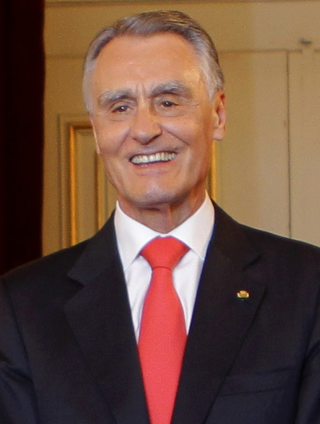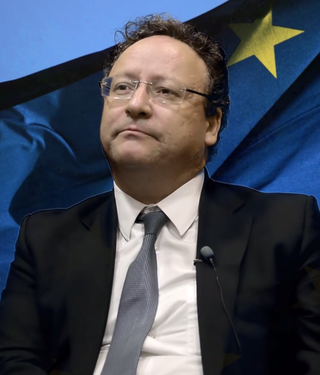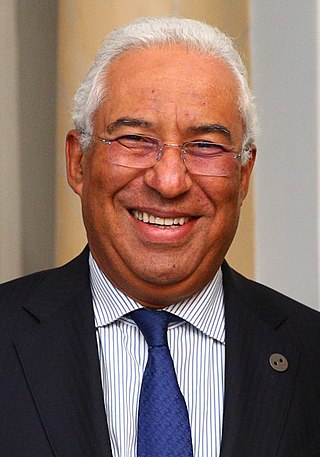 |
|---|
Elections to the Portuguese National Assembly were held in Angola in 1957 as part of the wider Portuguese elections. [1]
 |
|---|
Elections to the Portuguese National Assembly were held in Angola in 1957 as part of the wider Portuguese elections. [1]
The franchise was restricted, with only 56,108 of the population of approximately 4,335,000 registered to vote. [1]
A total of 49,084 voters participated in the election, giving a voter turnout of 87.5%. [1]

The National Congress is the legislative body of Brazil's federal government. Unlike the state legislative assemblies and municipal chambers, the Congress is bicameral, composed of the Federal Senate and the Chamber of Deputies. The Congress meets annually in Brasília from 2 February to 22 December, with a mid-term break taking place between 17 July and 1 August.

Elections in Angola take place within the framework of a multi-party democracy. The National Assembly is directly elected by voters, while the leader of the party or coalition with the most seats in the National Assembly automatically becomes President.

The Assembly of the Republic, commonly referred to as simply Parliament, is the unicameral parliament of Portugal. According to the Constitution of Portugal, the parliament "is the representative assembly of all Portuguese citizens". The constitution names the assembly as one of the country's organs of supreme authority.

Elections in Portugal are free, fair, and regularly held, in accordance with election law.

Elections in Guinea-Bissau take place within the framework of a multi-party democracy and a semi-presidential system. Both the President and the National People's Assembly are directly elected by voters.

Presidential elections were held in Portugal on 22 January 2006 to elect a successor to the incumbent President Jorge Sampaio, who was term-limited from running for a third consecutive term by the Constitution of Portugal. The result was a victory in the first round for Aníbal Cavaco Silva of the Social Democratic Party candidate, the former Prime Minister, won 50.54 percent of the vote in the first round, just over the majority required to avoid a runoff election. It was the first time in which a right-wing candidate was elected President of the Republic since the 1974 Carnation Revolution.

An election of MEP representing Portugal constituency for the 1994-1999 term of the European Parliament was held on 12 June 1994. It was part of the wider 1994 European election.
A European Parliament election was held in Portugal on 19 July 1987. It was the election of all 24 MEPs representing the Portugal constituency for the remainder of the 1984–1989 term of the European Parliament. Portugal had acceded to the European Community on 1 January 1986 and had been represented in the European Parliament by 24 appointed delegates until elections could be held. These elections took place on the same day of the legislative elections of 1987.

The Federal Senate is the upper house of the National Congress of Brazil. When created under the Imperial Constitution in 1824, it was based on the House of Lords of the British Parliament, but since the Proclamation of the Republic in 1889 and under the first republican Constitution the Federal Senate has resembled the United States Senate.

An election of the delegation from Portugal to the European Parliament was held on 7 June 2009.

Parliamentary elections were held in Portugal on 26 October 1969. The elections were announced on 12 August, and were the first under Prime Minister Marcello Caetano, appointed in the previous year to replace long-term Prime Minister António de Oliveira Salazar, who had been left incapacitated after a stroke. The quasi-sovereign National Union won all seats with an official turnout of 62.5%.

A referendum on creating administrative regions was held in Portugal on 8 November 1998. Two proposals were put to voters, the first on implementing the regions, and the second specifically asking whether voters approved of the new region for their area. The proposals were rejected by wide margins by voters.

An election was held in Portugal on Sunday, 25 May 2014, to elect the Portuguese delegation to the European Parliament from 2014 to 2019. This was the seventh European Parliament election held in Portugal.

The 2019 Portuguese legislative election was held on 6 October 2019. All 230 seats to the Assembly of the Republic were contested.

Electronic voting was first introduced to Brazil in 1996, with the first tests carried out in the state of Santa Catarina. The primary design goal of the voting machine is extreme simplicity, the model being a public phone booth. The voting machines perform three steps – voter identification, secure voting, and tallying – in a single process, aiming to eliminate fraud based on forged or falsified public documents. Political parties have access to the voting machine's programs before the election for auditing.

Local elections were held in Portugal on 1 October 2017. The elections consisted of three separate elections in the 308 Portuguese municipalities, the election for the Municipal Chambers, whose winner is automatically elected mayor, similar to first-past-the-post (FPTP), another election for the Municipal Assembly, as well an election for the lower-level Parish Assembly, whose winner is elected parish president. This last election was held in the more than 3,000 parishes around the country. In the 2017 election, 13.3 percent of incumbent mayors, 41 to be precise, were barred from running for another term.

Presidential elections were held in Portugal on 24 January. The incumbent President, Marcelo Rebelo de Sousa, was reelected for a second term.

An election was held in Portugal on Sunday, 26 May 2019, to elect the Portuguese delegation to the European Parliament from 2019 to 2024. This was the eighth European Parliament election held in Portugal.

Early legislative elections were held on 30 January 2022 in Portugal to elect members of the Assembly of the Republic to the 15th Legislature of the Third Portuguese Republic. All 230 seats to the Assembly of the Republic were up for election.

Local elections in Portugal were held on 26 September 2021. The election consisted of three separate elections in the 308 Portuguese municipalities: the election for the Municipal Chamber, whose winner is automatically elected mayor, similar to first-past-the-post (FPTP); another election for the Municipal Assembly ; and an election for the Parish Assembly, whose winner is elected parish president. This last one was held separately in the more than 3,000 parishes around the country. In the 2021 election, 12.3 percent of incumbent mayors, 38 to be precise, were barred from running for another term: 23 from the PS, 11 from the PSD, 3 from CDU and one from the CDS–PP.